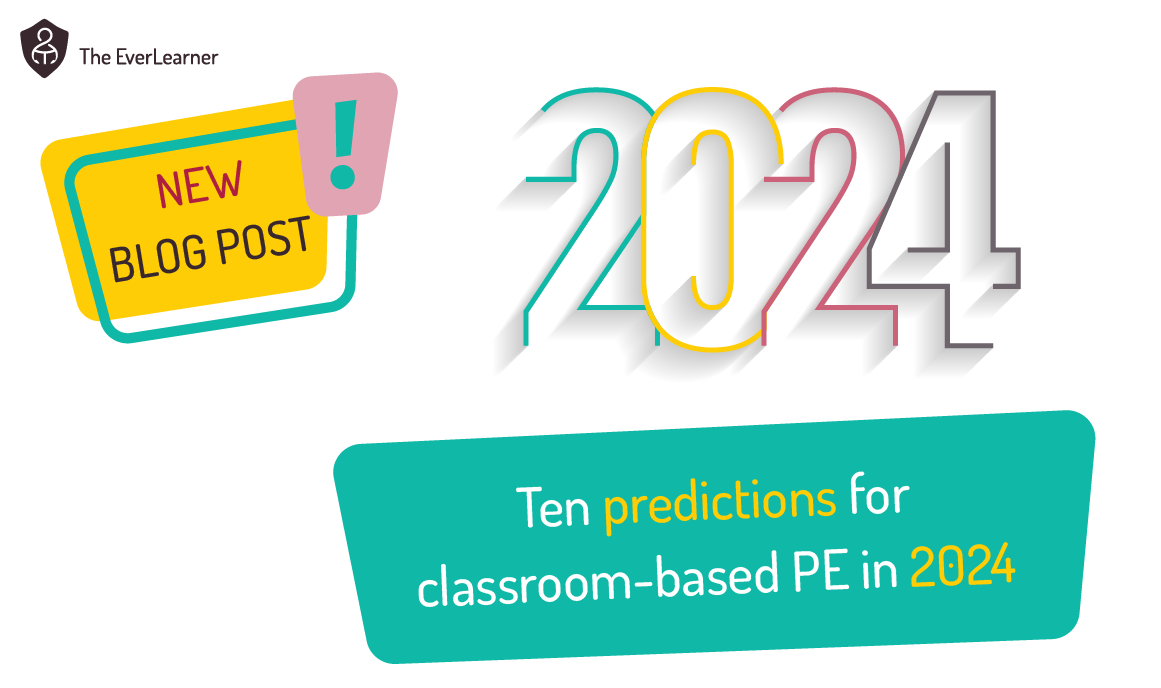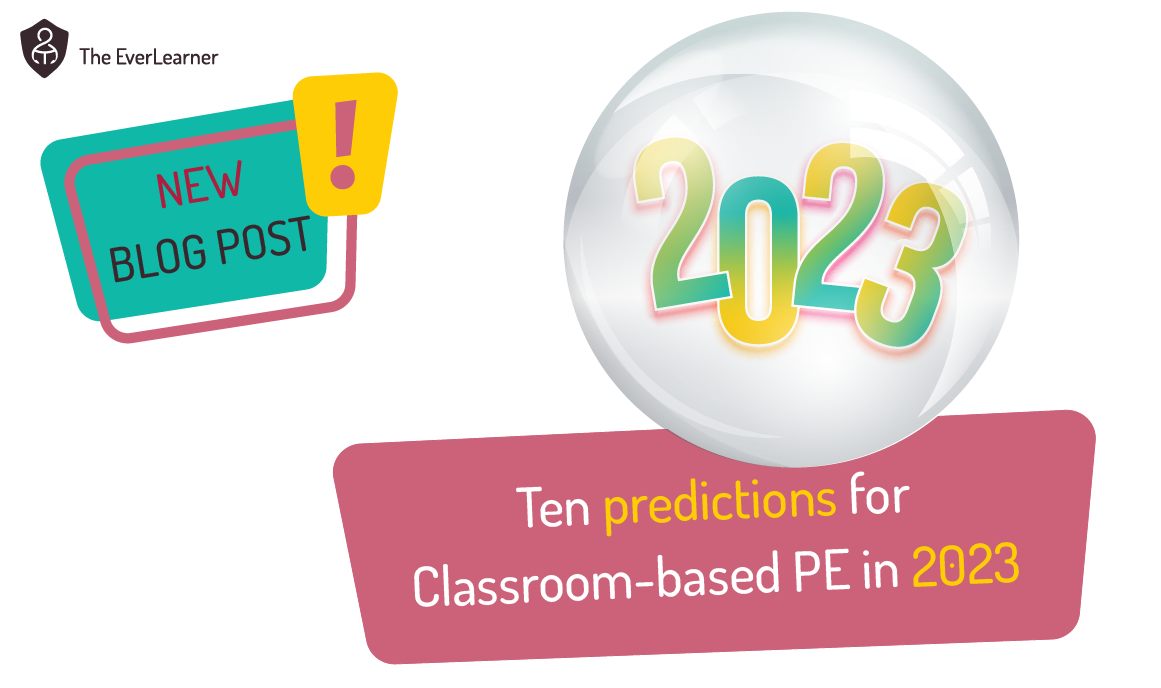If I were you... 2023/24
Today, Wednesday 4th October 2023, I am going to publish the first annual article (I’ll be publishing a new one each October) written for PE teachers with responsibility or management roles in their department. I am going to aim to give a series of insights into how I might, potentially, approach my role if I were in similar shoes to yours but –crucially– specifically in 2023/24.
If I were you in 2023/24, I would:
- Teach for skills
- Abandon practical lessons on GCSE/A-Level/BTEC/CNAT PE courses
- Reactivate
- Look to the long-term with qualifications
- “Manage up” 51% of the time
For context, I have been a PE teacher for 24 years. Whilst the most recent nine of these years have involved me blending my teaching work with a growing business, I remain dedicated to the PE profession and I believe I have something to offer to colleagues in post now.
If I were to describe my PE teaching, I would say that I am a good practical PE teacher, specialising in games, athletics, swimming and some elements of gymnastics and an excellent teacher of classroom-based PE. I also see teaching as a holistic opportunity and I believe I am very skilled at broadening a student’s experience to maximise all forms of learning. I am also a very good course manager and, perhaps, excel in the structuring of PE provision for teams of PE teachers. My full-time PE teaching career spanned 16 years with 11 of those years being head of PE or working on SLT.
With these points in mind and the, somewhat, unique position of being a hub of conversation and interaction relating to PE teaching through my work as the owner of TheEverLearner.com, I want to attempt to provide you with five insights that are worth considering in 2023. Remember, all of these ideas are my own personal opinions and should not compel anyone to change their own perspective unless you feel my writings are applicable to you and your context too. Remember too that I am specifically writing about qualification PE rather than core PE (with one exception). Whilst I have the utmost regard for core PE (it is in my heart) I do not see myself as an authority in this genre and, therefore, will not assume to advise others about this area of work.
Suggestion 1: In 2023/24, I would… teach for skills
I am strongly of the opinion that the focus of our qualification PE courses needs to be skill development via the PE subject domain, a concept I have written about extensively in a previous post entitled "How to Make Command Words your Teaching Strategy". This is not a macro claim where I am suggesting that the PE subject domain is not significant enough in its own right. No! The PE domain is critical to young people. Rather, I strongly believe that success in qualification PE courses is based on skill progression. Let’s take a GCSE PE course in 2023. A course like a GCSE requires students to develop the following✽:
- writing skills
- drawing skills
- mathematical skills including data analysis and graphical representations
- thinking skills
- performance skills
- movement analysis skills in relation
✽ This list is not exhaustive
So, an initial question could be:
or…
or...
So, if I take the idea of thinking and writing skills such as describing, explaining and evaluating, how are these skills being improved?
Take a look here at my GCSE yearly plan for a group of Year 10 students studying Edexcel GCSE PE taking note of the primary focus being skills. With this focus in mind, my team and I are challenged to develop these skills as a key focus of teaching and learning in our classrooms.
Suggestion 2: In 2023/24, I would… abandon practical lessons on GCSE/A-Level/BTEC/CNAT PE courses
This one may not be popular but I am going to make the suggestion regardless. I strongly believe that blocks of practical lessons focussing on assessment improvements are not worthwhile. Let’s assume that we are considering GCSE PE. In this context, the “traditional way” to structure the provision is to have a theory lesson and a practical lesson. Within the practical lesson, teachers may teach blocks of badminton, athletics, swimming, etc. in an attempt to provide assessment opportunities to students. Considering A-level PE, the model may be slightly different with the practical lesson being focussed on individual sports with each student preparing for their assessment in their (single) activity. This can often lead to a very dispersed experience.
In both cases, I believe that the likely progression in these circumstances is far too little on average. Therefore, what is the purpose?
In replacement of these lessons, I encourage qualification PE teachers and course managers to replace their practical lessons with the following provision:
- Ensure that the school’s extracurricular programme is as broad as possible and is capable of developing performance skills in many different activities.
- Ensure that core PE provision is as high-quality and relevant as possible.
- Ensure that all qualification-PE students are performing regularly in a combination of extra-curricular, curricular and club scenarios. This is an excellent opportunity for students to value community club continuation/engagement as part of their course experience.
- Ensure that practical assessment requirements are shared with students as early in a course as possible (the first lesson) and that regular one-to-one sessions take place in class to ensure that progression is occurring.
- Ensure that there are at least two assessment opportunities per academic year in each activity, meaning that students will experience four over the course of a two-year programme. These sessions should be diagnostic-focussed with the exception of the final assessment.
Finally, and perhaps most importantly, abandoning practical lessons in GCSE/A-Level/BTEC/CNAT PE lessons is surprisingly liberating. Ironically, it gives the PE teacher an excellent opportunity to engage students in skill development through the PE theory content in the practical setting. If I randomly (not that randomly) select a bunch of GCSE PE topics, is it fair to say that these lessons can, and perhaps should, be exemplified in practical sessions?
- Movement analysis
- Levers
- Cardiac values
- Aerobic and anaerobic energy
- Guidance
- Classification of skills
- PEDs (maybe not!)
My point is that (almost) all of the above can be taught and exemplified through movement. Therefore, abandoning “practical lessons” may well mean that students get more opportunities to engage in relevant practical activities that also support their theory studies.
Suggestion 3: In 2023/24, I would… reactivate
Unfortunately, human beings, including the students in our classrooms and sports halls forget things rapidly. This is a fact and, given the need for students to retain lots of ideas from the PE learning and to be able to retrieve them in context, owning this cognitive limitation is necessary and needs to be planned for in our course structures.
If I make a simple generalisation that, traditionally, PE courses have been delivered using a “one and done” model with one topic fitting neatly into one lesson before moving on, we can make a pretty solid argument that this would have caused forgetting. In fact, we could take this further and state that this “one and done” model is designed, albeit unintentionally, to promote forgetting. This needs to be reconsidered.
Reactivation is the term that I use when considering any retrieval practice or skill development that occurs after the peak learning point has occurred. Let me be clear: if we consider the lesson as the central unit, reactivation happens after the unit. For example:
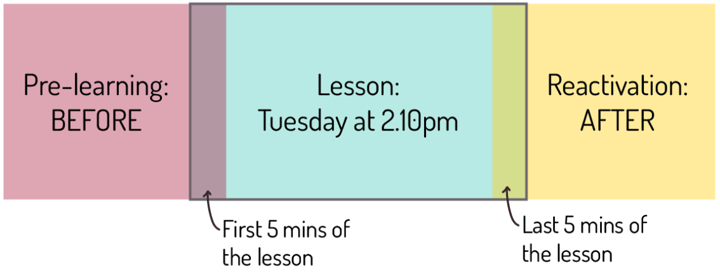
But reactivation is far more than doing some stuff after the lesson. If it weren’t, simply setting homework would suffice. No. Reactivation is an ongoing pattern and strategy to prevent forgetting over time that, when used correctly, can cause many other benefits than simply not forgetting.
In many previous posts, I have covered the nuance and detail of reactivation activities but below is a key summary of my own actions:
- Every group completes a weekly task between 09:00 Monday and 16:00 Friday (not weekends) incorporating 20 test-mode quiz questions covering all previously learned lessons. This is a “general” reactivation task. Here’s an example:
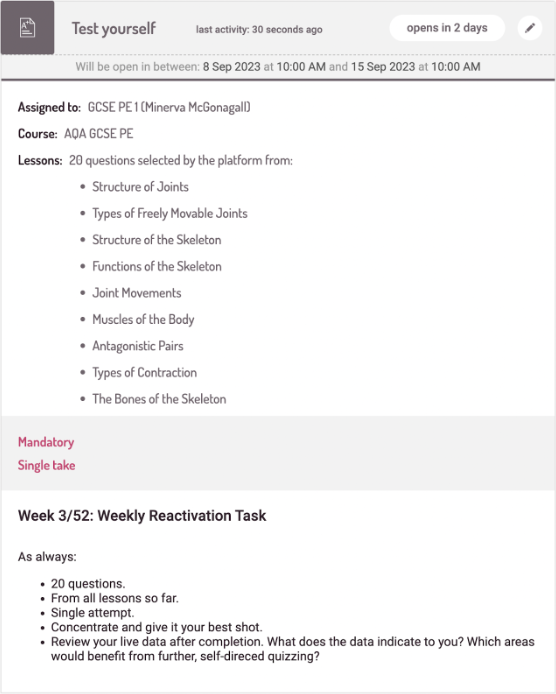
- Every group completes a lesson-reactivation mastery test-mode quiz. This is typically between 10 and 12 questions and will cause students to discriminate between strategically selected topics that could be confused. In other words, this task, set at a mastery standard, is tough! Here’s an example:
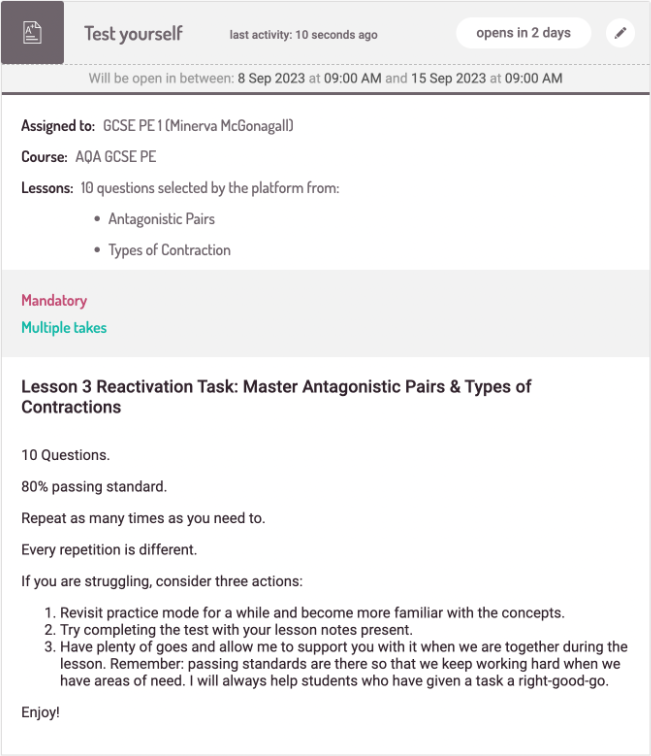
This work is done in addition to all classwork and is only part of the homework experience.
Suggestion 4: In 2023/24, I would… look to the long-term with qualifications
Let’s be clear: A-Level and GCSE PE courses are struggling nationally. Cohort numbers on both qualifications are falling. This is something that course managers in PE departments need to think about very carefully as they may experience pressure on course continuation in the immediate term. I would like to take the opportunity to urge all colleagues to protect and promote their PE qualifications and to acknowledge the importance of our pivotal PE qualifications. GCSE and A-Level PE courses matter and I urge colleagues to retain and promote them with determination.
The thing is, the world moves in cycles. Today, in late 2023, GCSE and A-Level PE are under pressure but this will change and centres and colleagues that have maintained their offer will benefit when the cycle changes. If I were you, I would battle every comment, suggestion and meeting where a colleague discusses the continuation and future of our courses.
Suggestion 5: In 2023/24, I would… “manage up” 51% of the time
This suggestion is a little more nuanced but it refers to the idea that a course manager or HoPE needs to manage in both directions. We will all be well aware of the importance of achieving consistency and buy in from our teams within the department and we will all have strategies for this. But have you stopped and considered exactly how you wish to “manage up” to your line manager, SLT link or senior leader? If not, do it. This practice will give you focus and determination to get the outcomes you need.
Managing up is not always about doing what you're told or following a policy precisely. It is often about appeasing a policy or strategy if that policy is not highly relevant to you. Remember that you get to decide what information you share with your line managers. Remember that they are reliant on you to illuminate the department or faculty. Remember that you can “manage them” in subtle but meaningful ways.
Try to consider what outcomes you want for each interaction. This is important as it will allow you to focus your time with them. Remember that your communication with your link colleague should be non-emotive (unless positive) and focused on your desired outcome.
Finally, be prepared to say “I don’t know… yet”. Managing up is about authenticity and there is great strength in a colleague who appreciates feedback and learning. When you are asked something you are unsure about, be direct: “Great question and honestly I don't have the answer right now. I will come back to you on this as immediately as possible.” Then follow this through. Your colleagues will really appreciate this.
So, there you have it. My five suggestions for 2023/24. What do you think?
Have a lovely day.
%20Text%20(Violet).png)
